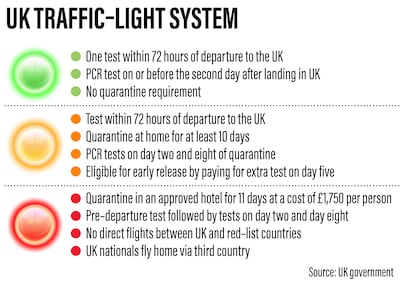Fully vaccinated travellers arriving in England will no longer have to isolate when they return home from amber list countries.
Transport Secretary Grant Shapps announced on Thursday the 10-day quarantine for those who are double vaccinated will end on July 19, the same date other social distancing measures are abolished in England.
Those under 18 who are not currently vaccinated will also be exempted from isolation.
For now, the measures apply only to returning UK residents who have received both shots in either England, Wales, Northern Ireland or Scotland.
Travellers must still take a PCR test two days after they return to the UK.
In a key change to the traffic light system for travel, the government will remove advice warning people not to travel to amber countries, effectively turning those countries green for vaccinated passengers.
Under the current rules, visitors to amber countries are required to self-isolate for 10 days on their return home.
Passengers from red list countries are still required to enter hotel quarantine on arrival, while green list passengers are not required to isolate regardless of vaccination status.
The UK government's traffic light system applies to England, with Scotland, Wales and Northern Ireland able to make their own rules.
However, the rules are broadly the same and previous changes to the lists have been adopted by all four nations.

'Reuniting families'
Mr Shapps said the changes would make it easier for British families to travel.
“Many people have not been able to travel for the last year and a half," he told the House of Commons.
"This is about reuniting families who have been apart throughout this pandemic. It’s about businesses that are able to grow and supporting the aviation sector that hundreds of thousands rely upon."
He said the government plans to extend the approach to visitors from major holiday markets including the US and EU later this summer.
"As one of the world’s most vaccinated countries, we must use these advantages to restore many of the freedoms that have been necessarily lost over recent months," he said.
The travel industry welcomed the changes.
“This is excellent news that will give a much-needed boost to millions of people across Britain looking forward to a more normal summer and reuniting with family and friends abroad," Heathrow Airport chief executive John Holland-Kaye said.
“The UK should open up travel to fully vaccinated people from more countries – particularly our key partners in the US – by the end of July."
British Airways chief executive Sean Doyle said it was a “common sense approach”, but acknowledged “there is more work to do”.
“While the quarantine requirement for amber countries is being lifted for fully vaccinated UK travellers, the Government needs to quickly extend this to all vaccinated travellers, agree a reciprocal deal with the US, add more countries to the green list and reduce the need for unnecessary, expensive tests,” he said.
Ryanair chief executive Johan Lundgren, however, was concerned testing requirements could still deter people from travelling.
"With unnecessary testing staying in place, more needs to be done. We do not want to see a return to flying being a preserve of the rich, and expensive testing could sadly make travel out of reach for some this summer," he said.
However, the requirement to take a test after arriving in the UK could add hundreds of pounds for a family to travel overseas and back.
The main opposition Labour party urged the government to let people use free NHS tests for travel purposes.
"PCR tests often cost over £100 ($138) a person," Shadow Transport Secretary Jim McMahon said.
"The government could stop the rip off we see with private testing companies using their capacity in the NHS testing sites."
Mr Shapps said he had seen an in-person coronavirus test costing as little as £10 - although the majority still cost more than £50 and in many cases more than £100.
"Since May the costs have continued to be driven down," he said.
Former prime minister Theresa May, a critic of the government's travel policy, said it was essential more staff should be sent to airports to ensure a "smooth movement of people through our borders".
In his announcement, Mr Shapps said "people should expect their experience at the border should be different with longer waiting times than before".
However, he clarified these remarks by saying longer check-in queues were expected, with airlines required to check vaccination status before boarding.
On Wednesday, Prime Minister Boris Johnson described double vaccination as a "great liberator".
"In principle and in practice, it’s going to be great," he said.
The changes come in time for England’s school holidays, offering a boost to the ailing travel industry which has struggled with lockdowns and closed borders for more than a year.
Jozsef Varadi, chief executive of discount carrier Wizz Air, said the changes would make “a hell of a difference”.
“The moment these restrictions are relaxed there is a boost and people take advantage of every opportunity arising”, he said.
Travel groups warned that despite the progress on overseas trips, expensive tests and other requirements could still hit demand.
“As always, the devil is in the detail”, said the World Travel and Tourism Council's senior vice president, Virginia Messina.
“There could well be some people who get caught out by the myriad of complicated rules and regulations which could scupper their much-needed summer holidays.”










